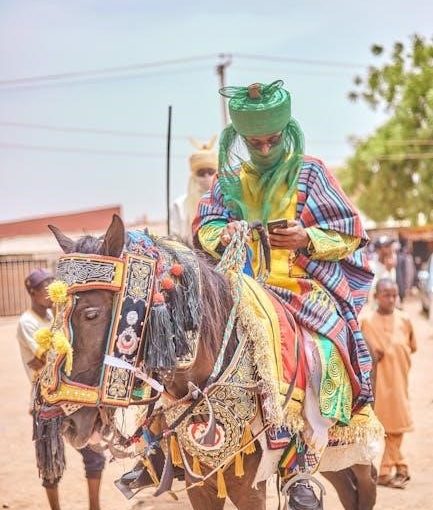Wole Soyinka’s Death and the King’s Horseman is a powerful exploration of tradition‚ duty‚ and cultural conflict in colonial Nigeria‚ blending tragedy with profound cultural insight.
Overview of the Play
Death and the King’s Horseman‚ written by Wole Soyinka‚ is a tragic play set in Oyo‚ Nigeria‚ during World War II. It revolves around Elesin Oba‚ the king’s horseman‚ who is tasked with ritually following the deceased king to the afterlife. The play explores the clash between Yoruba traditions and British colonial interference‚ as Elesin’s ritual is disrupted by colonial authorities. This interruption leads to a tragic chain of events‚ highlighting themes of cultural identity‚ duty‚ and the devastating impact of colonialism on indigenous traditions.
Historical Context of Colonial Nigeria
Set during World War II‚ Death and the King’s Horseman reflects the tense atmosphere of colonial Nigeria‚ where British rule disrupted traditional Yoruba customs. The play is based on a real incident in 1946‚ where the British intervened in a ritual suicide‚ highlighting the clash between colonial authority and indigenous traditions. This historical backdrop underscores the broader struggle for cultural preservation and autonomy in the face of foreign domination‚ providing a rich context for the tragic events of the play.
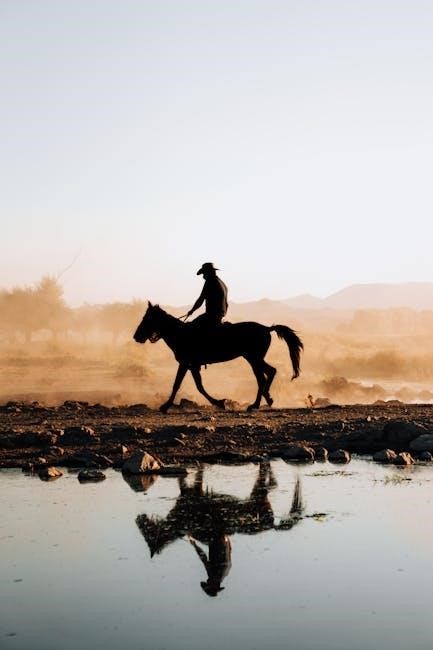
Themes Explored in the Play
Death and the King’s Horseman explores themes of tradition‚ duty‚ and the clash between colonialism and indigenous culture‚ highlighting the tension between personal sacrifice and cultural identity.
Tradition vs. Colonialism
The play vividly portrays the clash between Yoruba traditions and British colonial rule. Elesin’s ritual suicide represents cultural duty‚ while colonial intervention symbolizes external disruption. This conflict highlights the tension between preserving ancestral practices and adapting to imposed foreign values‚ reflecting Soyinka’s critique of colonialism’s disregard for indigenous traditions. The marketplace‚ a symbol of Yoruba culture‚ contrasts sharply with the colonial authorities’ attempts to suppress it‚ emphasizing the struggle for cultural survival in a colonized society.
Duty and Sacrifice
Elesin Oba’s journey embodies the profound themes of duty and sacrifice. As the king’s horseman‚ he is bound by tradition to follow the deceased king to the afterlife‚ ensuring his safe passage. This duty is not just a personal obligation but a cultural mandate‚ reflecting the Yoruba belief in communal responsibility. However‚ Elesin’s delay and desire to savor life before death reveal a human struggle with fate. His internal conflict highlights the tension between individual desire and collective expectations‚ underscoring the sacrificial nature of his role and the cultural significance of fulfilling it.
Life‚ Death‚ and the Afterlife
The play delves into the Yoruba belief in the afterlife‚ where death is not an end but a transition. Elesin’s role as the king’s horseman underscores the sacred duty to guide the deceased king’s spirit. His hesitation to embrace death reveals a human struggle with mortality‚ while the praise-singer’s chants emphasize the communal expectation of honor and continuity. The afterlife is portrayed as a realm requiring ritual integrity‚ and Elesin’s delay disrupts this spiritual balance‚ highlighting the tension between personal desire and cultural obligation.
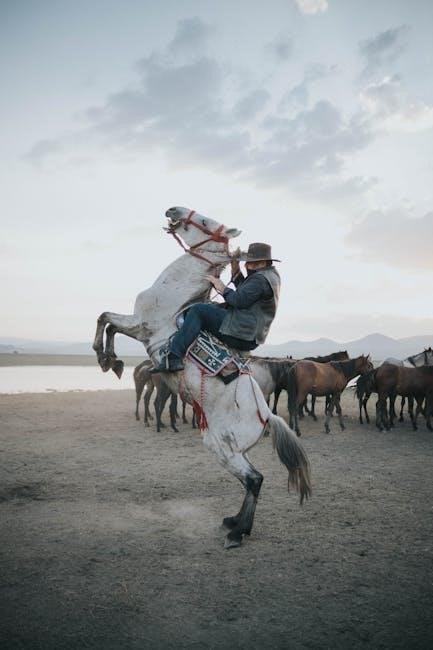
Key Characters in the Play
The play revolves around Elesin Oba‚ the king’s horseman‚ and Simon Pilkings‚ the colonial officer‚ alongside other significant figures like Iyaloja‚ Olunde‚ and the Praise-Singer.
Elesin Oba: The King’s Horseman
Elesin Oba is the king’s horseman‚ tasked with escorting the deceased king’s spirit to the afterlife through ritual suicide. A complex figure‚ Elesin embodies both vitality and resignation‚ his lively presence in the marketplace contrasting with his impending death. The praise-singer underscores his noble resolve‚ yet Elesin’s delay reveals a deep human struggle. His role is vital to maintaining cultural harmony‚ as his failure jeopardizes the community’s balance. His journey reflects the tension between personal desire and communal duty‚ making him a tragic hero in a clash of tradition and colonial interference.
Simon Pilkings: The Colonial Officer
Simon Pilkings represents colonial authority‚ intervening in Elesin’s ritual to prevent his suicide. His actions‚ though well-intentioned‚ stem from a lack of understanding of Yoruba traditions. Pilkings embodies the clash between colonial modernity and indigenous customs‚ viewing the ritual as primitive. His wife‚ Jane‚ initially sympathizes with Elesin‚ highlighting the internal conflicts within the colonial mindset. Pilkings’ interference underscores the broader theme of cultural misunderstanding and the imposition of foreign values‚ ultimately disrupting the delicate balance of Yoruba tradition and communal harmony.
Other Significant Characters
Jane Pilkings‚ Simon’s wife‚ exhibits a mix of curiosity and misunderstanding toward Yoruba traditions. The Praise-Singer plays a vital role‚ celebrating Elesin’s honor and reinforcing his duty. Iyaloja‚ the leader of the marketplace‚ embodies the community’s respect for tradition. Olunde‚ Elesin’s son‚ returns from studying medicine‚ symbolizing the clash between modernity and tradition. These characters highlight the complexities of cultural identity and the broader societal tensions‚ contributing to the play’s rich tapestry of themes and emotions.
Plot Summary
Set in 1943 Nigeria‚ Elesin Oba‚ the king’s horseman‚ must ritually die to escort his king to the afterlife‚ but colonial authorities intervene‚ sparking cultural conflict.
Setting: Oyo‚ Nigeria‚ During World War II
The play is set in Oyo‚ Nigeria‚ during World War II‚ specifically in 1943. The bustling marketplace serves as a central location‚ symbolizing the heart of Yoruba culture and tradition. The British colonial presence looms large‚ creating tension between indigenous practices and foreign rule. The wartime context adds urgency to the story‚ highlighting the clash of values and the disruption of traditional rituals. This setting underscores the cultural and historical backdrop of Elesin’s journey‚ blending vibrant communal life with the looming shadow of colonialism.
The Ritual of the King’s Horseman
The ritual of the king’s horseman is a sacred Yoruba tradition‚ demanding Elesin’s voluntary death to guide the deceased king’s spirit to the afterlife. This ancient practice‚ steeped in cultural and spiritual significance‚ ensures the king’s safe transition and maintains cosmic balance. Elesin‚ as the chosen horseman‚ must embody courage and devotion‚ surrendering his life to fulfill his duty. The ritual is not just a personal obligation but a communal necessity‚ reflecting the Yoruba belief in the interconnectedness of life‚ death‚ and the afterlife.
The Intervention of Colonial Authorities
The colonial authorities‚ led by Simon Pilkings‚ intervene to prevent Elesin’s ritual suicide‚ driven by a misunderstanding of Yoruba traditions and a desire to assert British control. Pilkings‚ representing colonial power‚ arrests Elesin‚ disrupting the sacred ritual and causing a cultural clash. This intervention not only halts the traditional rite but also leads to Elesin’s internal conflict and the community’s despair. The colonizers’ interference highlights the tension between indigenous beliefs and imposed Western values‚ culminating in tragic consequences for Elesin and his people.
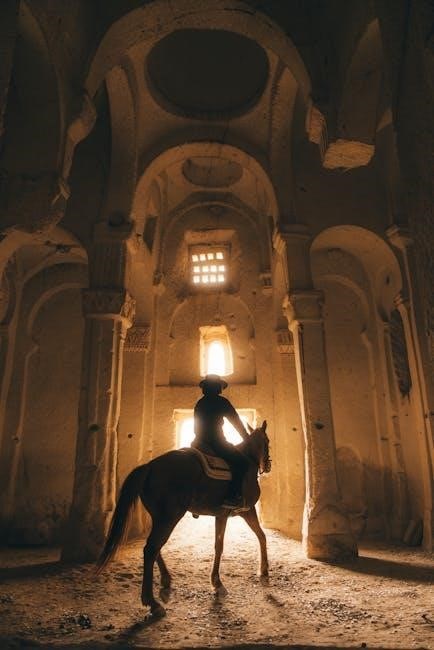
Symbolism and Cultural Significance
The marketplace symbolizes the heart of Yoruba tradition‚ while the Praise-Singer embodies cultural memory. These elements reflect the deep-rooted values and identity of the community.
The Marketplace as a Symbol of Tradition
The marketplace in Death and the King’s Horseman symbolizes the vibrant heart of Yoruba culture‚ where traditions are upheld and communal bonds are strengthened. It serves as a space for celebration‚ negotiation‚ and cultural exchange‚ reflecting the collective identity of the people; The bustling energy of the marketplace contrasts sharply with the solemnity of Elesin’s impending death‚ highlighting the tension between life-affirming traditions and the inevitability of fate. This setting underscores the play’s exploration of cultural resilience and the clash between tradition and external forces.
The Role of the Praise-Singer
The Praise-Singer in Death and the King’s Horseman acts as both a chronicler and a moral guide‚ celebrating Elesin’s lineage and reinforcing cultural values. His role is to honor the deceased king and remind Elesin of his sacred duty‚ ensuring the ritual’s continuity. Through his chants and praises‚ he bridges the past and present‚ emphasizing the importance of tradition. The Praise-Singer’s presence also heightens the emotional and cultural significance of Elesin’s journey‚ serving as a voice of collective memory and communal identity in the face of impending tragedy.
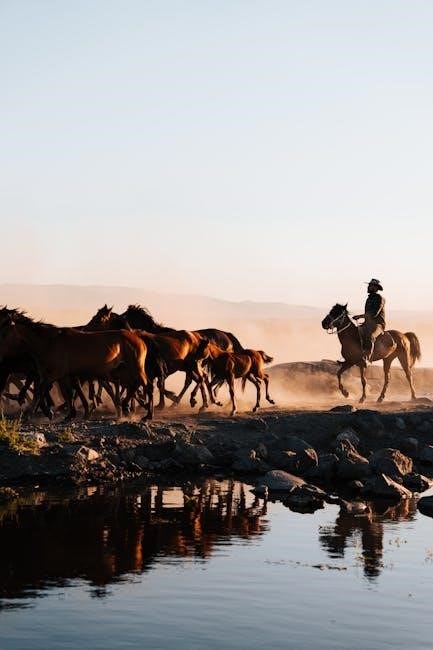
Critical Reception and Legacy
Death and the King’s Horseman is celebrated as Wole Soyinka’s masterpiece‚ earning global acclaim for its profound exploration of cultural identity and colonial conflict‚ solidifying its place in world literature.
Impact on African Literature
Death and the King’s Horseman has profoundly shaped African literature‚ offering a powerful critique of colonialism and a celebration of Yoruba culture. Soyinka’s masterpiece‚ blending traditional rituals with modern theatrical techniques‚ has inspired generations of African writers. Its exploration of cultural identity and resistance to colonial oppression resonates globally‚ solidifying its place as a seminal work in postcolonial literature. The play’s acclaim‚ including Soyinka’s Nobel Prize in 1986‚ has elevated African voices in global literary discourse‚ making it a cornerstone of African literary studies and a testament to the continent’s rich cultural heritage;
Modern Performances and Adaptations
Death and the King’s Horseman continues to captivate audiences worldwide through various adaptations and performances. The play has been staged internationally‚ including a notable production at the National Theatre in London‚ directed by Rufus Norris. Its universal themes of cultural clash and personal duty resonate with contemporary audiences. Additionally‚ the play has been translated into multiple languages‚ such as French and Yoruba‚ expanding its reach. These modern interpretations ensure Soyinka’s work remains relevant‚ bridging cultural divides and fostering cross-cultural understanding while preserving the richness of Yoruba traditions and the depth of its storytelling.
Death and the King’s Horseman remains a powerful testament to cultural identity and resilience‚ offering timeless reflections on tradition‚ duty‚ and the enduring spirit of a nation.
The Enduring Message of the Play
Death and the King’s Horseman delivers a timeless message about the clash of cultures and the importance of tradition. It highlights the tension between African heritage and colonial imposition‚ emphasizing duty‚ sacrifice‚ and the preservation of cultural identity. Soyinka’s masterpiece underscores the resilience of indigenous values in the face of external forces‚ resonating universally. The play’s exploration of life‚ death‚ and colonial disruption remains a powerful commentary on cultural conflict and the enduring spirit of a nation striving to maintain its traditions in a changing world.
